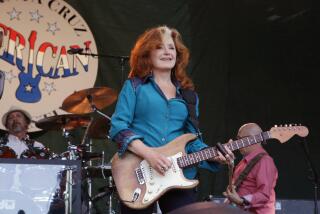POP MUSIC REVIEW : George Strait Steers Clear of Those Deeper Waters
- Share via
Let’s hope George Strait has had all his inoculations.
If not, he’s bound to catch something from all those flower-bearing babes he bussed between songs Sunday at the Pacific Amphitheatre.
But then, the health risk was the only risk the big-grinnin’, big-hatted Texan took in a show notable for a safe superficiality that pretty much summed up the sad state of country music, 1989. And there’s no vaccination for vacuousness.
Of course, if shallowness is the mark of contemporary country (anyone remember the revolution that was supposed to have been taking place a couple years ago in Nashville?), then the wildly popular Strait makes a fitting head of state.
It was clear Sunday that his success has at least as much to do with his being a whistle-baiting hunk (“the Mark Harmon of country,” second-billed Kathy Mattea called him, and he could have built a Pink Floyd-like wall with all the flowers he was given) as it does with his music--a Strait-arrow, white-bread distillation of Texas swing and honky-tonk styles that carries nary a hint of the innovative genius associated with such pioneers as Bob Wills and Hank Williams Sr.
Which isn’t to say that Strait and his solid Ace in the Hole Band are without merit--his voice is as shiny as his teeth, and the band has a natural feel for the styles. But you’d never know from their version of the Wills arrangement of “Milk Cow Blues,” or facile Strait hits like “All My Exes Live in Texas,” the explosiveness and inventive sass of Wills’ fusion of hillbilly music and swing jazz. (By the early ‘50s, Wills’ music was, for all intents and purposes, rock ‘n’ roll--several years before Elvis recorded a note.)
Nor would you know from all the punny wordplay Strait seems attracted to (“I have so many exes and owe so much I oughta be on ‘Hollywood Squares,’ ” goes a recent hit) the kind of pain and need that drove ol’ Hank.
Strait didn’t even use the inherent dynamics of the music to good effect Sunday, as soppy ballads alternated indiscriminantly with the more upbeat numbers, never building to any kind of climax.
There’s nothing wrong with looking to the past for inspiration when the present is bankrupt, but--as Lyle Lovett and Rodney Crowell, among others, are showing--you can make something new of it, not just copy and (in this case) sanitize it.
An even better (?) example of sanitized regression came from opening act Baillie and the Boys, which draws not upon country but its very distant relative, ‘70s California pop a la Karla Bonoff and Wendy Waldman. Baillie et al. even did a bland version of Cal-pop icon J.D. Souther’s “Faithless Love.”
Mattea fared a bit better, thanks largely to her pure alto and winning personality. But there’s little in her twang-pop to distinguish her--these songs would sound the same done by any pure alto and winning personality.
And the one time she did jump from the mold, her direction was questionable. No doubt, her a cappella tribute to black folk singer Odetta was well-intentioned, but the sight and sound of this very white chick doing a Negro field holler was a bit hard to swaller--especially her use of ethnic syntax and jargon. You half-expected black-face.
More to Read
The biggest entertainment stories
Get our big stories about Hollywood, film, television, music, arts, culture and more right in your inbox as soon as they publish.
You may occasionally receive promotional content from the Los Angeles Times.








